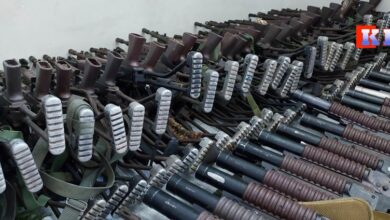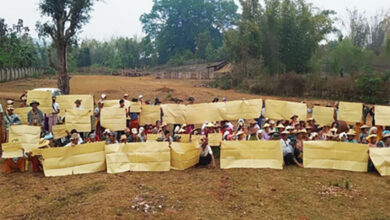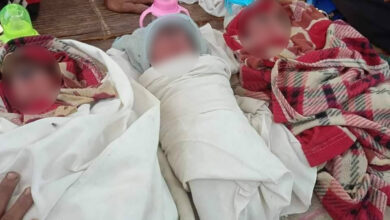Karen Animists: “We Want The Right To Live on Our Land and Worship Our Gods…

In 1997 the Burma Army forced Karen people from the Mutraw (Papun) District in Karen State from their homes. Many of these people were practicing animists. During the forced displacement, villagers unable to live on their land were many of their deity’s lived, lost many aspects of their Karen animism beliefs. Despite living in displacement, fear and hardship, five Karen villages in the Mutraw District mobilize began to revive their traditional animism beliefs and practices.
Saw Oh Moo, a community leader blamed the Burma military dictatorship for the driving his people of their traditional lands so that they could not practice their animist beliefs.
“We are not referring to all Burman people – only the Burmese military dictatorship. Because of their oppression, burning and destroying our village, we couldn’t live in our homeland and perform our traditional beliefs and practices.”
Saw Oh Moo told Karen News that living as displaced people meant they were unable to worship or practice their rites or ceremonies.
“We cannot perform this kind of practice unless we live in our own village – it gradually vanished.”
Bway Paw, a villager said that the displacement also had a negative impact on the young people as they lost belief.
“There were no more spiritual and social taboos, our ancestors’ prohibitions (a kind of unwritten policy of the Karen ancestors based on social and spiritual taboos) did not exist anymore. And our way of life became inconsistent – not fully practicing or believing in either animism or Christianity. This is such a chaotic and unsystematic way of life.”
Naw Ha Mya said that the lost of their traditions had a huge impact on villagers and left many without a cultural anchor.
“Children and young adults of this generation lacked knowledge about our traditional taboos. Our generation still practice and are serious about these taboos, yet our children’s generation have no idea about the great spiritual significance of the universe and God…displacement made it difficult for us to keep practicing and performing our traditional beliefs.”
Naw Eh Htee Paw, a student from Htee Haw Lay Ko village, told Karen News that she regrest not having the opportunity to live in her own land and have the chance to understand the beliefs her ancestors followed.
“I started to run away from the Burmese Army when I was 5 to 6 years old. Since then I have never had a chance to return and live in my village and Kaw [customary communal land area]. My original village is called Thay Baw – now some villagers have returned to work in their paddy fields, but they don’t dare to stay in the village. I never had a chance to return to my Kaw and to learn the old ways.”
Bway Paw said that when the Burmese military forced the villagers to flee, “we lost everything we had. Our livestock was gone… our life became full of misery. We have little food, as there is no place for us to collect food, we just hide in the jungle. And in one case my children’s father [husband] kept running until he became exhausted and lost his energy that forced him to hide in the jungle – I don’t know when my turn will come.”
Saw Oh Moo, a community leader, said that the present ceasefire situation had made it better for villagers.
“If we compare it to the past, because there is less restrictions on our livelihoods, we are able to perform and practice our traditional beliefs as it is stable, but I think it will only last for a short-time. For the long-term, there will be more threats to us because the current military activities of the Burma Army in our area is to build roads, transport their food supplies and to fortifying their military outposts.”
Naw Ha Mya, a villager said that if the Burma Army were relocated away from their village they would return.
“They would oppressed us if we returned to our village and we would have to live under its control. We have to stay away from them and keep cultivating in other villagers’ fields. I hope that one day they will return to their own places.”
Saw Oh Moo, a community leader agreed and said that he hoped “for the demobilization and demilitarization of the Burmese Army in our area, so that local people will no longer suffer from repression and hardship, no more displacement, no more environmental destruction or wildlife hunting [by the Burma Army].”
Saw Oh Moo said villagers relied on the Karen National Union to advocate on their behalf.
“We want to ask our mother organization (KNU) to sympathize with us and support and understand our difficulties, engage in genuine peace talks, and not to only speak from their own perspectives. If we are to remain displaced like this, we will not be able to practice and perform our traditional beliefs, cultural practices, and when our traditional and cultural practices disappear, our Karen people will also disappear…this is the biggest concern for us.”
Naw Eh Htee Paw, a student from Htee Haw Lay Ko village said that if she is to have a better life and future the Burma Army needed “to stop its atrocities, and if I have the right to freedom of livelihood then I want to conserve the forests and live freely as other peoples do in other countries.”
Villagers told Karen News that they live in hope that the current peace talks between the Karen National Union (KNU) and the Burmese government will improve their living standards, that they have freedom to be able to earn a living, travel freely to have the freedom to perform and practice their religious practices.
The United Nations Declaration on the Rights of Indigenous Peoples, Article 11 states that
1. Indigenous peoples have the right to practise and revitalize their cultural traditions and customs. This includes the right to maintain, protect and develop the past, present and future manifestations of their cultures, such as archaeological and historical sites, artefacts, designs, ceremonies, technologies and visual and performing arts and literature.
2. States shall provide redress through effective mechanisms, which may include restitution, developed in conjunction with indigenous peoples, with respect to their cultural, intellectual, religious and spiritual property taken without their free, prior and informed consent or in violation of their laws, traditions and customs.




